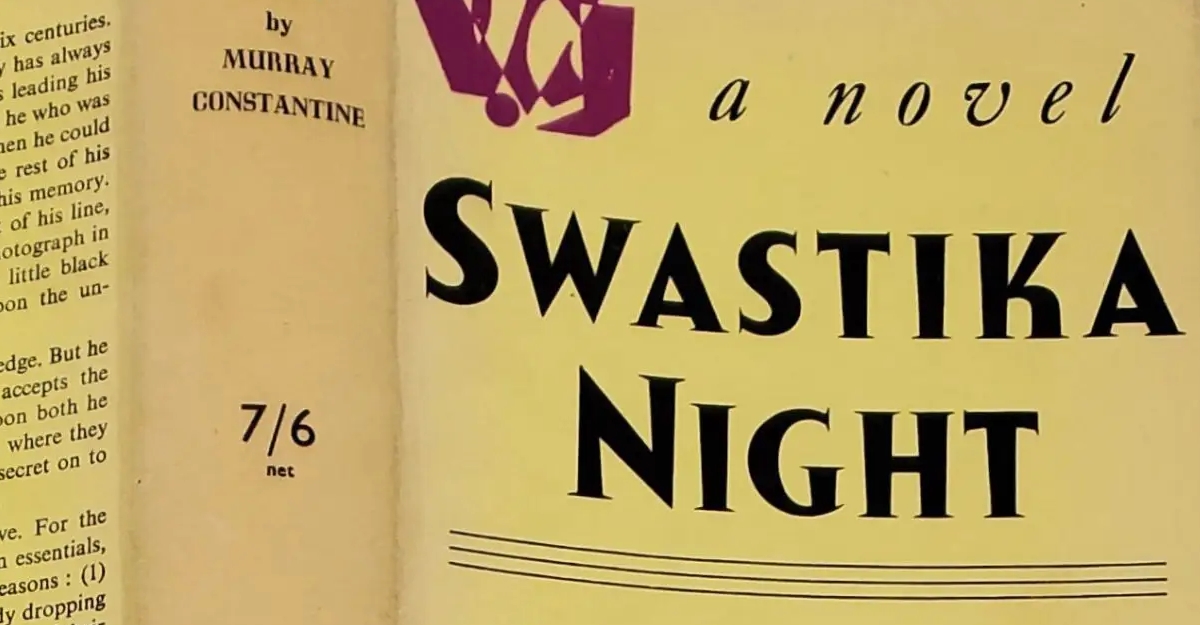‘Did I just see what I thought I did?’
Open is a photograph album from pre-World War Two France—a My Trip book of a world facing cataclysm. Shots show student hikers in rural France, including my father. They have found on the track an abandoned teddy bear, with one paw upraised, in what looks like a Nazi salute.
So they responded, jokingly saluting a fluffy bear Führer.
These students were hardly ignorant of the imminent conflict. If they found levity in an absurd moment, it was not fellow-travelling, nor appeasement. They simply did not know how dark the future would be.
Someone who did was the English writer Katharine Burdekin (1896-1963). Born Katharine Cade, she wanted to attend Oxford University but her parents forbade it. Instead, in 1915, she married Rhodes Scholar, lawyer and Olympic rower Beaufort Burdekin. The Burdekins were Sydney merchants and landowners. They sponsored explorer Ludwig Leichardt, and in return he stamped their name upon non-ceded Australia.
The couple had two daughters and returned to Australia in 1920. Beaufort was sporty, and appeared in social columns. Katharine, by contrast, was working on a first novel. She took the manuscript to John Lane in London, accompanied by her children—and never returned.
Anna Colquhuon appeared in 1922, about a gifted pianist with a domineering husband. The magazine Table Talk termed the heroine a ‘super-vamp … a home-wrecker of the smashing variety’, hinting on it being drawn from life. The next year, Beaufort petitioned for divorce on the grounds of desertion. Katharine had not complied with a Court Order for restitution of conjugal rights.
She settled in Cornwall, where her sister Rowena Cade ran the Minack Theatre. A second novel, The Reasonable Hope, appeared in 1924, mingling bohemia with Cornish scenes. The hope in question was a Happy Futurity. The Sydney Sun complained: ‘Billy is not even male and ‘The Faun’ is epicene’. Here she depicted unconventional sex roles, but also what we would call the non-binary. In 1926 she met Isobel Allan-Burns (1906-2002), a psychologist who became her lifelong companion.
A biography of Burdekin is sorely needed. She belonged to the sisterhood documented fictionally in Shelby Wynn Schwartz’s After Sappho (2022): creative, taking the poet’s work and life as inspirational. While living in regional seclusion, she had one degree of separation from some major players, like Vita Sackville-West.
Burdekin’s forte became exploring gender via fantasy or speculative fiction. The Children’s Country, written for her daughters, imagined a non-sexist world; the historical The Rebel Passion depicted a medieval monk with the soul of a woman (both 1929). Gender-bending via transmigration was also a theme with crime-writer Fergus Hume, a disguised means of writing the queer.
As Burdekin’s work became increasingly outspoken, she assumed the pseudonym Murray Constantine. Proud Man (1934) features a visitor from the future who is non-binary, telepathic and capable of self-fertilisation. ‘The Person’ terms homo sapiens ‘Subhumans’ mired in ‘sex misery and sex antagonism.’ Indeed: ‘A privilege of class divides a subhuman society horizontally, while a privilege of sex divides it vertically.’
Could a woman have published such radical thoughts under her own name?
*
Swastika Night was published by the left-wing Gollancz. Using extrapolation, if-this-goes-on, and reportage from Germany from a friend, journalist Margaret Goldsmith, Burdekin wrote what might be described as The Handmaid’s Tale with Nazis. Set in a far future with Nazi and Japanese Empires, it is utterly original and highly disturbing.
‘Kirche, kinder and küche’ was the Nazi’s ideal for women. Feminist organisations were suppressed in 1933, at the same time as Hitler’s regime was targeting minorities, including the small transgender community. Abortion became punishable with the death sentence. Burdekin’s extrapolation had women caged, kept for breeding only. The future Nazis are universally homosexual, concerned only that their extreme misogyny is apparently causing fewer girl babies to be born, which might lead to extinction.
Small wonder the writer used a pseudonym, something she guarded rigorously. A reprint followed in 1940, with one change: the author felt Nazism would be only temporary. The actual war sent her into a spiral of depression. She published one further book, a historical cowritten with Goldsmith. Thereafter her books were less political than spiritual, and unpublished. Only illness stopped her writing.
Burdekin’s real identity was revealed in the 1980s by scholar Daphne Patai. Burdekin found a new audience, with reprints and the publication of a new manuscript, The End of this Day’s Business, written before Swastika Night. It was the inverse, a future world in which men are subjugated, an ambiguous utopia (to use Le Guin’s term).
Swastika Night might not have entered popular consciousness, but remains among the best anti-Nazi novels. If the top feminist dystopias can be similarly rated, then Burdekin competes with Atwood, and Suzi McKee Charnas’ 1974 Walk to the End of the World. The Handmaid’s Tale and Philip K. Dick’s The Man in the High Castle made television, so why not Swastika Night, which combines both their themes, most adroitly?
In the online SF Encyclopedia critic John Clute notes Burdekin: ‘can now be seen as one of those twentieth-century figures whose absence from view during that century now seems very close to tragic.’ She made choices, and one of them was privacy. Swastika Night was personally perilous to write in the 1930s—in Dick’s novel, a Nazi assassin is sent after a similarly seditious author.
But with her identity revealed, Burdekin should not be absent from our discourse. While some aspects of her work can be challenging, including the English nationalism of Swastika Night, her bold speculations were extraordinary for the period—as is the fact that she got them into print with major publishers, to appreciative reviews. As a writer on gender Burdekin is even more relevant in our troubled times. Her words, her ideas, retain their danger now.



